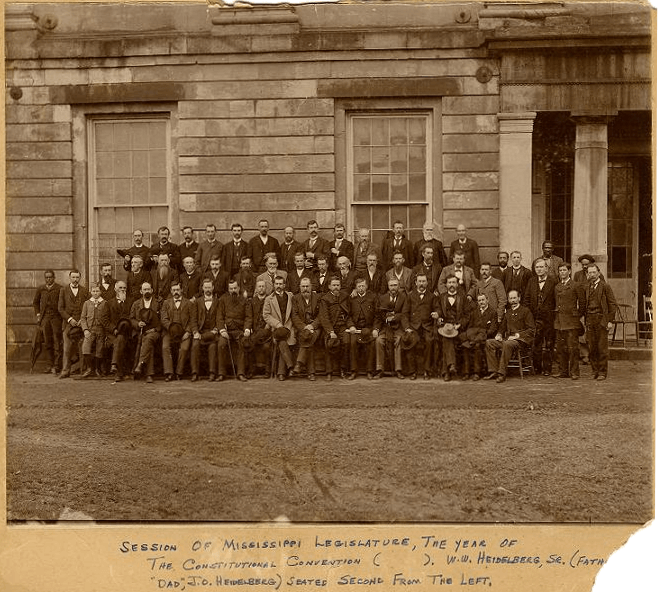

Wikimedia Commons
The Mississippi Legislature in 1890, the year a constitutional convention formed wit the stated goal of disenfranchising African Americans in the state. Several provisions of that constitution have been the subject of lawsuits in recent years, most recently a requirement that statewide candidates capture a majority of state House districts to win election.
Mississippi voters Tuesday repealed language from the state’s 1890 Constitution that could prevent candidates winning a majority of the vote from taking office.
The vote marks the first time Mississippians on their own, without federal courts stepping in, have opted to remove from the Constitution one of the multiple Jim Crow-era provisions designed to prevent African Americans from holding office.
Other Jim Crow provisions of the 1890 Constitution such as the poll tax, literacy test and separate-but-equal school districts were removed by Mississippi voters long after they were found unconstitutional by federal courts or they were banned by federal law. In other words, while these provisions were still in the state Constitution, they were no longer being enforced because of federal action.
The language repealed by Tuesday’s vote mandated that candidates running for the eight statewide offices do two things: garner a majority of the vote and win the most votes in a majority of the 122 House districts. Under the constitutional provisions, if no candidate was able to do both, the election was thrown to the House to decide between the top two vote-getters.
A lawsuit was filed in 2019 challenging the constitutionality of the language throwing election into the House, often called Mississippi’s version of the electoral college. In response to the lawsuit, U.S. District Judge Daniel Jordan of the Southern District of Mississippi indicated that if the state did not remove the provision, he might be forced to do so.
“I assume the judge would love for the state to address this,” Secretary of State Michael Watson said earlier this year. “It is something I think he would prefer.”
The Legislature’s two presiding officers, Lt. Gov. Delbert Hosemann in the Senate and House Speaker Philip Gunn, also got behind the effort to remove the language.
Gov. Tate Reeves, on the other hand, never gave an endorsement of the proposed change, saying it was designed “to help elect Democrats” to statewide office.
No other state has provisions that would prevent the person garnering the majority of the vote from being seated. Tuesday’s vote still leaves the state outside of the mainstream in terms of electing candidates. Most states – 46 of them – require a candidate for statewide office to win only a plurality of the vote. The provision Mississippians adopted, crafted by the legislative leadership, mandates a runoff among the top two vote-getters if no candidate garners a majority of the vote.
It takes approval by a two-thirds vote of both chambers of the Legislature and then the approval by voters to change the Constitution. The Constitution also can be changed through a complex citizen initiative process.
The 2019 lawsuit alleged the process of throwing the elections into the House dilutes Black voter strength. Black Mississippians are more likely to vote for the Democratic candidate, but because House districts are drawn to maximize the number of Republicans serving in the House, it is difficult for Democratic candidates to win the most votes in a majority of the House districts, the lawsuit claimed.
The language was placed in the Constitution in 1890 at a time when African Americans were a majority in the state. The lawsuit cited a volume of the Mississippi Historical Society as saying the Constitution was written in 1890 in a manner to ensure the white minority controlled the House of Representatives and was “the legal basis and bulwark of the design of white supremacy in a state with an overwhelming and growing negro majority.”
In the 1990s, three races were thrown into the House. In two elections for lieutenant governor, the losing candidate — Brad Dye in 1991 and Eddie Briggs in 1995 — asked the House to select the candidate who won the most votes. In 1999, Republican Mike Parker, who lost the popular vote, unsuccessfully took the election to the House where Democrat Ronnie Musgrove, who garnered the most votes, was elected by the representatives.
The post For the first time in state history, voters remove Jim Crow provision from Mississippi Constitution appeared first on Mississippi Today.
- UMMC clinic closures extend to Friday amid cyberattack recovery - February 25, 2026
- Regency Hospital in Meridian to close by mid-March - February 25, 2026
- Advocates call for funding, collaboration as more Mississippians are expected to struggle with food insecurity - February 25, 2026